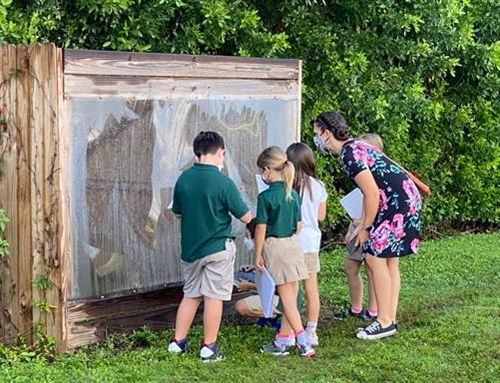

Second Graders Abuzz Over Plants And Pollinators
Source/Author: Raffi Darrow, Ebytes Editor
December 03, 2021
Second graders started the school year excited to explore the topic of bees and pollinators. Through a deep-dive investigation during the first semester, they learned about gardening, pollinators, plants, bees and much more related science they can observe every day in the world around them.
Did you know there is a beehive on campus? Second graders met with Shorecrest's beekeeper, Josh Harris. Mr. Harris shared what Chargers need to do as a community to support the school colony. He described the honey harvesting process and answered many questions about the different roles honeybees play within a colony and the life cycle of bees. Students observed the beehive as part of their first scientific observations documented in their inquiry notebooks. Everyone learned how to sketch a bee and label it to display their understanding of honeybee anatomy. They were able to observe worker bees foraging for nectar right outside their classroom doors.
Next, classes read about bees and used iPad devices to enthusiastically observe live bees in their hives through a 360-degree, virtual reality video. They were able to see the different layers in the hives, watch the worker bees do their jobs, and even spotted a few drones.
To represent their learning up to this point, each student constructed a honeybee from recycled materials. They worked very hard to create models with two antennae, six legs - some learners were able to create the three different sections of the bee body (head, thorax, and abdomen).
Next, second graders learned about the anatomy of flowers and the symbiotic relationship between flowers and honeybees. They learned about other important pollinators too, such as bats. Now they can explain what pollination is and why it's necessary for flowers and plants to survive.
“Farmer Ray” (Ray Wunderlich from Wunderfarms), a former Shorecrest student and perennial consultant on campus regarding gardening, returned to campus for a gardening session. Thanks to the second graders and Farmer Ray, the Shorecrest Lower School garden now has a fruit tree corner! They planted banana and papaya trees as well as cucumber seeds. Farmer Ray taught a scientific approach to preparing a garden for pollinator plants, and classes planted a few flowers.
When October rolled around, students scooped seeds out of pumpkins to count, weigh, measure, separate, and sample them. They also scraped off the outer layer of a sunflower to count the seeds safely tucked inside. The Chargers observed how math and science connect in the real world through these hands-on activities.
Toward the end of the unit, second graders researched a self-selected plant and pollinator topic for a summative project. The technology team provided kid-safe research sites for students to dive deeper into plant and pollinator topics that were of interest to them. They gathered facts and other helpful information from websites and nonfiction books. They learned to synthesize and organize their information. After some final touches to their visual displays and practice sharing facts with others, parents were invited to campus for pollinator project shares. Classrooms were buzzing with creative and fun displays of pollinator facts and knowledge.
In November the Chargers took a trip to the Florida Botanical Gardens. Through hands-on stations and activities guided by the staff at the gardens, they were excited to learn in the natural environment and see pollinators and plants working together. Students impressed the staff with their knowledge of pollinators and plant anatomy as well! To share their knowledge, Mrs. Oman’s class wrote a play about taking care of bees and gardens, and performed it for their families in the campus garden.
Did you know that over 70% of the food we eat requires bees and pollination? Second graders now understand how essential bees are in our world! They know how to be good stewards towards bees and other pollinators, and the potential risks if we were to lose bees and other pollinators.
























